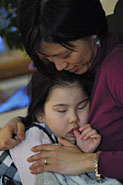Parenting in the new millennium
Parenting in the new millennium McGill University
User Tools (skip):
Parenting in the new millennium
Whether it was Dr. Spock, Penelope Leach, "baby whisperer" Tracy Hogg, or your own mother, if you are a parent, chances are that you have sought the advice of child-rearing experts at one time or another.
 Photo: Owen Egan
Photo: Owen Egan |
|
For over a decade, the Faculty of Education has been doing its part to help parents deal with some of the challenges of raising children. This year, McGill's popular parenting workshop series, Parenting in the New Millennium, began February 5 and runs Wednesday nights until April 9.
The parenting series has been offered for about 12 years ever since education professor Dr. Jeff Derevensky first set up workshops and made child-rearing experts available to parents. Last year, 700 parents attended the workshops. Over the years, this series has taken different formats, but the focus remains the same: to use McGill's expertise and contacts to offer Montreal parents access to some sage advice. "I believe that the faculty needs to keep in touch with the community which includes both the schools and parents," says Dean of Education Ratna Ghosh, a strong supporter of the series.
Surprisingly, this workshop series is unique in Montreal. "People phone me and say I've been looking for this stuff everywhere. It's so badly needed in the community," says Jennifer Coutlee, special events and conference coordinator for the Faculty of Education and organizer of the workshops for the last three years. She examines evaluations filled out by parents after each workshop to determine the issues they would like to see addressed.
Given that most participants are parents, the workshops are designed to be parent friendly rather than academic in tone. Each session is designed to promote interaction between participants and the speakers. "It's not just someone up there lecturing," explains Coutlee.
One of this year's opening workshops "All Work and No Play: How to achieve balance in your family life" focused on how to deal with the conflicting demands of work and family. "We are so busy that sometimes we forget that we have a life," said workshop speaker Lucy MacDonald, a Montreal area counsellor and consultant. MacDonald advocates looking at your life as a whole, deciding what your priorities are and focusing time and attention on the things most important to you.
MacDonald proposed one strategy which was met with murmurs of approval from the parents in the audience. "Lower the housework standards," she suggested, pointing out that kids don't notice how clean the house is, but do notice how much time you spend with them. "Our children know we spend time on what's important to us."
Karen Aziz, mother of three-year-old Alexander, says her husband attended the workshop series last year and liked it so much that they both attended this year. She chose the "All Work and No Play" workshop because she is looking for tips on how to balance her work with her family life. "My job takes a lot of hours away from home and I see some mothers who do it all and I want to be able to do it all as well." Aziz appreciated getting practical tips on making life a little easier and the discussions that took place during the workshop. "I liked hearing what the other parents have to say. It makes you feel you're not alone."
Coutlee has looked over workshop seminar brochures from the last 12 years and says that surprisingly little has changed in terms of parenting concerns. "The core issues seem to be the same whether it be discipline, communication or teen delinquency."
Some issues have changed over time. The number of children diagnosed with Attention Deficit Hyperactivity Disorder, for instance, has increased in recent years, and parenting techniques which used to be tolerated by society are no longer acceptable. "Violence in the schools is now a big concern as well as anger management. People used to spank their kids or yell at their kids, but now this is not something we want to teach our kids because we are the example. So [parents want to know] 'what am I supposed to do if I can't get mad?'"
Coutlee says she sees even skeptical parents leaving the workshops having learned something. "I don't think I've ever had one walk away who didn't say it was great. People come up to me and say 'I feel like I'm leaving with strategies and tools.'"
For a schedule or more information call 398-2712 or go to www.mcgill.ca/edu-parenting.

